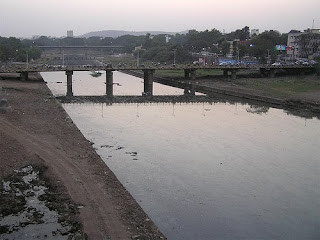Land use changes hydrologic system and have potentially large impacts on water resources. An assessment in an area with seasonally limited water availability and which is subject to rapid socio- economic development and population growth will provide an exemplary view on the local impacts of major recent developments in India. In this backdrop this paper analyzes past land use changes between 1989 and 2009 and their impacts on the water balance in the Mula and Mutha Rivers catchment upstream of Pune. The aim of the paper is:
- assess the land use changes between 1989/1990 and 2009/2010
- analyze the impacts of these changes on the long-term water balance components in the Mula and Mutha Rivers catchment upstream of the city of Pune.

View of the Mutha Mula flowing through Pune (Photo courtesy: Arjun Sharma's blog)
With a brief description of the methods and materials used to carry out the study, the paper goes on to elaborate on the current and historic land use classification of the study area. In the next level the authors provide an assessment of land use change impacts on water resources. Following this the results and discussion of the study carried out are spelt out.
Following are the conclusions made by the authors:
- Urbanization has been the main driver of land use change. It has led to the shift of cropland towards the Western part of the study area. Since this trend is expected to progress in future there will be more reduction of cropland.
- The ongoing urbanization will result in less evapotranspiration, more run- off and will have negative effects on water quality.
- An increase of agricultural area leads to an exacerbation of the imbalance of water availability and demand in dry season due to increased consumption of irrigation water, whereas urbanization results in more runoff during rainy season due to the increase of paved surface area.